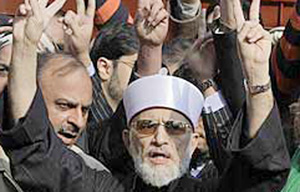Lahore/Islamabad, Jun 23: Amid high drama, Canada-based cleric Tahir-ul-Qadri returned to Pakistan today after authorities diverted his Islamabad-bound flight to Lahore fearing unrest in the capital, as clashes between his supporters and police left many injured.
Qadri, a 63-year-old cleric who drew tens of thousands of supporters for a sit-in protest here in January last year demanding electoral reforms, refused to come out of the plane in Lahore saying the aircraft should be taken to its original destination or the army take him in its protective custody.
But later, Qadri came out of the Emirates plane after successful talks with Punjab Governor Chaudhry Muhammad Sarwar inside the aircraft.
The process of Qadri's immigration has been completed and he was set to leave for his residence in the Model Town area, Geo TV reported.
Sarwar was at the airport with his official car in which Qadri will leave the premises.
The thaw in the standoff came after government refused to involve army for negotiations as Qadri had demanded.
Private guards were also being arranged by Qadri's supporters as he has refused to take any government security.
Many supporters of Qadri's Pakistan Awami Tehreek (PAT) were present outside the airport in Lahore.
Qadri, who has dual nationality, has come back from Canada to lead what he called a "revolution" against the Nawaz Sharif-led government.
Ten supporters of Qadri, including two women, were killed last week during violent clashes with the police.
Last year, Qadri paralysed the capital by rallying thousands of supporters to demand postponement of elections. He had asked for electoral and political reforms before polls.
Earlier today, Qadri had refused to disembark from the plane, saying, "I will not leave the plane until the army officers come and take me in their protective custody."
"I have no trust in the PML-N government which is the murderer of my supporters in Lahore. I will not hold talks with the government. I will only listen to the Pakistan army," Qadri said while talking to the media by phone.
Meanwhile, clashes erupted between police and Qadri's supporters in Lahore, Islamabad and Rawalpindi, leaving scores of policemen and activists injured.
Over 70 police personnel were injured when PAT workers pelted stones at them near the airport in Islamabad, Radio Pakistan reported.
Many of Qadri's supporters also sustained injuries in clashes with the police in the capital.
Police had to fire tear gas shells to disperse Qadri's supporters.





Comments
Add new comment